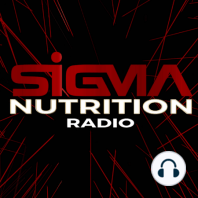60 min listen

SNP7: Stephan Guyenet, PhD - Ask Me Anything!
SNP7: Stephan Guyenet, PhD - Ask Me Anything!
ratings:
Length:
17 minutes
Released:
Jul 19, 2022
Format:
Podcast episode
Description
This is an “ask me anything” (AMA) episode, which means a world-class expert and past podcast guest comes on the podcast to answer questions submitted by you, our podcast listeners. Stephan Guyenet spent 12 years in academia studying neurodegenerative disease and obesity neuroscience. He was a postdoctoral fellow at the Univeristy of Washington, studying the neuroscience of obesity and eating behavior. Previous to that he completed a PhD in neuroscience. Stephan is the author of the popular and well-received book ‘The Hungry Brain‘, which lays out the science behind the brain’s role in obesity. To subscribe to Premium (and get the full episode) go here. Questions Answered In Full Episode “When someone undergoes liposuction or other surgery that removes adipose tissue, is there a sudden reduction in leptin levels? While this may reduce leptin resistance, could the drop in leptin lead to increased hunger over time?” “What is the current research around how chronic energy restriction (or following crash diets) affects appetite hormones and/ or appetite regulation long term? Is there a physiological mechanism influencing overeating attributable to appetite dysregulation caused by chronic dieting? I ask as this is something I am often tackling in my nutrition consultancy but research in biochemical and physiological mechanisms seems lacking.” “Can you talk about the conditions of anorexia and morbid obesity and how they essentially defy the rules of metabolic compensation? In other words- I understand anorexia to be a mental health condition where the individual starves themselves with a purpose to control weight. And morbid obesity being excessive consumption despite over fatness, etc. If the body has these numerous mechanisms by which calorie restriction or calorie over- consumption results in these compensatory processes-driving us to eat more/less slow us down/speed us up, and many more; do these individuals not “hear” these signals or are they just adept at ignoring them or is it that their bodies have lost the ability to compensate for their under or over consumption? Additionally, can anyone become anorexic or morbidly obese? Or is it merely genetics?” “Why do some SDRIs (serotonin–dopamine reuptake inhibitors) and serotonin precursors reduce hunger/appetite? E.g. 5-HTP and Wellbutrin (Bupropion)” “Question about the ideal weight program: As an iOS developer, my instinct is to assume determinism and quantifiability of the entire universe. I believe this to be fundamentally true. But what is hypothetically possible differs from what we can realistically know. I worry that attempts like yours to quantify some seemingly qualitative measures are doomed. I have similar concerns about happiness research. How do you reassure yourself you can really construct an algorithm that deciphers the “ideal weight program” for any given user – do you rely on averages?” a. Quick explanation of the ideal weight program “In 2018 a poster was presented at the annual meeting of the Society for Neuroscience titled ‘The human brain microbiome; there are bacteria in our brains!’ which showed bacteria apparently penetrating and inhabiting the cells of healthy human brains. While the work was preliminary, have you heard of any further work in this area? What is your opinion on the possibility that, if bacteria do inhabit the brain, they could play a part in appetite regulation and/or obesity similar to how the gut microbiome can affect our health?” “It seems like there are significant differences in policies put forth between researchers from biomedical backgrounds and ones from public health policy backgrounds. Dr [David] Allison touched on this during recent interviews, noting that there is very little evidence regarding the efficacy of upstream obesity prevention interventions, such community gardens, combatting food deserts, nutrition education, and cooking classes. On the other hand, governments are increasingly turning to such interventions, as
Released:
Jul 19, 2022
Format:
Podcast episode
Titles in the series (100)
SNR #41: Dominic Munnelly - CrossFit, Nutrition for Performance & Female Trainees: Episode 41: Dublin-based trainer & competitive CrossFit athlete Dominic Munnelly is on the show to talk about where CrossFit fits in to the health & fitness industry, some of the criticisms it faces, considerations for female trainees &... by Sigma Nutrition Radio